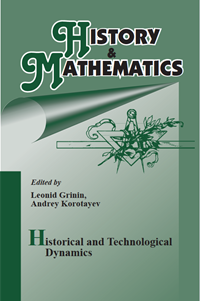
|
History & Mathematics:Historical and Technological Dynamics: Factors, Cycles, and TrendsBibliography: Volgograd: ‘Uchitel’ Publishing House, 2022. – 288 pp.
Edited by: Edited by Leonid E. Grinin, and Andrey V. Korotayev
ISBN 978-5-7057-6106-7 Editorial Council: Herbert Barry III (Pittsburgh University), Leonid Borodkin (Moscow State University; Cliometric Society), Robert Carneiro (American Museum of Natural History), Christopher Chase-Dunn (University of California, Riverside), Tessaleno Devezas (University of Beira Interior), Jack A. Goldstone (George Mason University), Leonid Grinin (National Research University Higher School of Economics), Antony Harper (Eurasian Center for Big History & System Forecasting), Peter Herrmann (University College of Cork, Ireland), Andrey Korotayev (Higher School of Economics), Alexander Logunov (Russian State University for the Humanities), Georgy Malinetsky (Russian Academy of Sciences), Sergey Malkov (Russian Academy of Sciences), Charles Spencer (American Museum of Natural History), Rein Taagepera (University of California, Irvine), Arno Tausch (Innsbruck University), William Thompson (University of Indiana), Peter Turchin (University of Connecticut), Douglas White (University of California, Irvine), Yasuhide Yamanouchi (University of Tokyo).
|
The present Yearbook is subtitled Historical and Technological Dynamics: Factors, Cycles, and Trends. Its articles demonstrate different forms, patterns, and modes of evolutionary development of societies and their subsystems both over very long periods (in fact, the whole historical process) and over relatively short time intervals. We believe that without an in-depth analysis of the forms and mechanisms of development, it is more difficult to understand both the dynamics of the historical process and many contemporary issues rooted in history.
The issue consists of three sections: (I) Long-term Dynamics Factors; (II) Political Cyclicity and Trends; (III) Technological Dynamics and Phases.
We hope that this issue will be interesting and useful both for historians and mathematicians, as well as for all those dealing with various social and natural sciences.